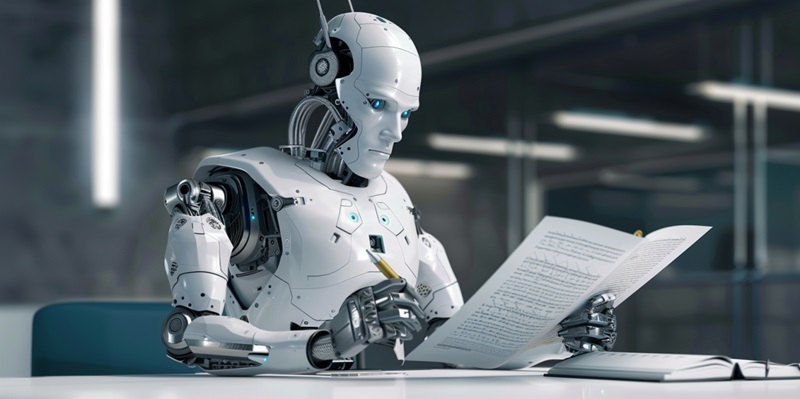The intriguing intersection of generative AI and human creativity forms the crux of a recent study, spotlighting the complex interplay between technological assistance and originality in artistic writing. Researchers Anil Doshi of University College London and Oliver Hauser from the University of Exeter scrutinized how OpenAI’s GPT-4 model influences the creative output of writers. The findings reveal a nuanced impact of AI on human creativity. The researchers embarked on an empirical investigation to dissect just how significantly AI tools like GPT-4 could revamp the traditional landscape of creative writing, and their discoveries offer a balanced view on the merits and drawbacks of such technological interventions.
The Study’s Design and Methodology
To rigorously assess the influence of generative AI on creative writing, Doshi and Hauser conducted an empirical investigation with 500 participants. These participants were assigned the task of crafting eight-line stories under varied conditions, ranging from receiving a single AI-generated idea to receiving up to five AI suggestions, while a control group had no AI assistance whatsoever. This structured variability enabled the researchers to gauge the spectrum of AI influence, exploring everything from minimal to substantial inputs.
The evaluation of the produced content hinged on two key indices: a “novelty index” and a “usefulness index.” The novelty index was designated to measure how original and unique the stories turned out, whereas the usefulness index assessed their appropriateness, feasibility, and publishability, particularly for an audience aged 15 to 24. Employing these indices allowed the researchers to build a robust framework for analyzing the creative merit of each story, ensuring that the assessments were both comprehensive and insightful. This dual-index system was crucial in capturing a significant breadth of qualitative insights into the kinds of impacts generative AI could have on artistic endeavors.
Enhancements in Novelty and Usefulness
The study’s findings are compelling, suggesting that stories incorporating AI-generated ideas scored significantly higher in terms of both novelty and usefulness when compared to those created without AI assistance. Evaluators found AI-influenced stories to be more enjoyable, less boring, and markedly less predictable. This improvement in several dimensions reflects that generative AI can indeed elevate certain facets of creativity, leading to narratives that are more engaging and imaginative.
However, an intriguing paradox soon surfaced: despite the apparent boost in novelty and usefulness, AI-assisted stories also exhibited a noticeable degree of similarity to each other. This increased homogeneity implies that writers might lean heavily on AI-generated suggestions, potentially sacrificing their unique voices and thereby standardizing creativity to a certain extent. This finding underscores a critical tension in the use of AI within creative fields: while AI can serve as an inspiration and creative catalyst, it may also inadvertently foster a convergence in artistic output, diluting the very originality it seeks to enhance.
Differential Impact on Writers
Another significant insight from the study is the differential impact of AI on writers with varying levels of inherent creativity. Researchers utilized the divergent association task (DAT), a metric for assessing an individual’s innate creativity, to classify their participants. They found that the benefits of AI assistance were particularly pronounced in individuals who were initially less creative. AI seemed to bolster these individuals’ ability to generate novel ideas, effectively serving as a powerful tool to augment creativity where it might be lacking.
This finding carries implications for the long-term effects of AI on less inherently creative individuals. While AI can serve as a valuable scaffold to enhance immediate creative output, reliance on AI for innovation might potentially stymie the development of independent creative skills. This poses challenges for long-term creative growth, raising questions about whether continued AI assistance could limit the evolution of intrinsic creative abilities over time. Therefore, while AI holds promise for democratizing creativity, it also risks imposing constraints on the cultivation of inherent talent.
Questions of Ownership and Authorship
The study also brought to light societal ambivalence towards AI-generated content, particularly concerning questions of ownership and authorship. Evaluators were less inclined to attribute full ownership of AI-assisted works to the human writers involved. This skepticism regarding authorship underscores broader questions about originality and intellectual property in the age of AI. If AI significantly shapes a piece of creative content, to what extent can it be considered the original work of the author? This ambivalence indicates that society is grappling with the ethical and legal implications of AI’s role in creative fields.
These concerns about authorship and originality reflect ongoing debates over the ethical and legal facets of AI-generated content. As AI systems become increasingly integrated into creative processes, understanding who owns the creative product and acknowledging the contributions of both human and machine will become ever more pressing. The reluctance to attribute full creative ownership to humans when AI is involved hints at broader uncertainties and the need for clear guidelines and regulations in this emerging domain.
Implications for Future Research and Broader Applications
The fascinating convergence of generative AI and human creativity is at the heart of a recent study, shedding light on the intricate relationship between technological aid and originality in artistic writing. Scholars Anil Doshi from University College London and Oliver Hauser of the University of Exeter delved into how the GPT-4 model by OpenAI affects the creative processes of writers. Through their research, they discovered the complex impact that AI can have on human creativity. By conducting a thorough empirical examination, the researchers assessed the extent to which AI tools like GPT-4 can transform the traditional domain of creative writing. Their findings present a balanced perspective, acknowledging both the advantages and limitations of such technological interventions. This study stands as a significant contribution to understanding how AI may assist or hinder the creative processes of writers, ultimately changing the landscape of creative endeavors.

